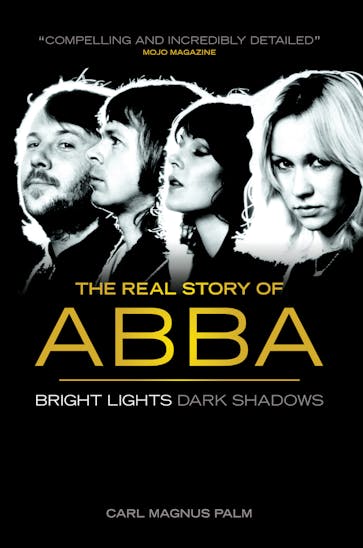Books about ABBA and related subjects
ABBA biographies, musical examinations and pictorial surveys
Sydney Morning Herald interview
published April 01, 2010
Sydney Morning Herald (Australia), September 5, 2001
Thank you for the music - now for the gossip
Sweden's fab four weren't always kings of kitsch, writes Bernard Zuel.
Smokey Robinson was never a member of Abba. Indeed, he wrote his best stuff while the four members were mere single letters. But having read the first authoritative biography of the biggest pop act of the '70s you could believe that Smokey penned their theme song: "But don't let my glad expression give you the wrong impression/Really I'm sad, I'm sadder than sad."
Of course we knew about the divorces - The Winner Takes It All and Knowing Me Knowing You captured that like a musical Kramer vs Kramer. And of course some of those outfits were tragic. But what about the political attacks in Sweden from those who saw the band as running dogs of the capitalist class and traitors to independent Sweden? Or that Frida Lyngstad was the child of a wartime liaison between a German soldier and a Swedish girl, something which sent her and her grandmother to Norway to escape the opprobrium? Or Agnetha Faltskög's distaste for the limelight that began with a reluctance to tour at the height of their fame, developed into paranoia as the media descended on her and climaxed with a retreat into Garbo-esque seclusion a decade ago?
Not that Carl Magnus Palm's Bright Lights, Dark Shadows is all darkness. It's hard even for four Swedes to be permanently down when confronted by success and wealth that mere mortals can barely comprehend. And we do have those photos of Benny Andersson and Björn Ulvaeus in their pre-Abba bands, the Hep Stars and the Hootenanny Singers, to amuse.
But as even a cursory examination of the subtext of SOS or the lyrics of The Winner Takes It All would tell you, it wasn't all beer and herrings.
"There was more pain and turmoil than you could see at the time but they were so focused on making the best record with singable lyrics it was probably subconscious for most of the time," Palm says. "In Agnetha's case I am sure she regrets ever becoming a public figure. She regards it as a big mistake."
This is the third Abba book - after a complete guide to their recordings and a picture book - by Palm, a youthful-looking 36-year-old who stumbled into rock biography by wisely avoiding music journalism. He thinks he has more Abba in him, which is odd given his avoidance of the band while growing up in the 1970s. He didn't really come out as a fan until 1980.
"I did like them secretly but I realised afterwards that I had watched all the television shows, bought the albums," says Palm.
But as he explains in the book, the ambivalence about the group in Sweden was not surprising even as the rest of the world - and indeed large numbers of Swedes - were falling for the wholesome foursome. A concurrent movement in early-'70s Sweden known as Progg - based in part on progressive rock principles but also in left-wing politics - consistently saw the band pilloried in the press and within the small industry.
"It was strange days in Sweden in the 1970s," recalls Palm. "The arguments were so illogical. It was just the times. It wasn't politically correct to like Abba. But people did love them. They were in the wrong place at the right time."
These days, of course, it's not only politically correct to like Abba, it's almost de rigueur for those who like to look on pop with a post-modern eye that mixes irony and intellectual distance. People who, in the old days when the term cultural commentator had yet to be invented, were known as tossers.
Not that Bjorn & Benny, Agnetha & Anni-Frid (as the group were known on their first single, Ring Ring, in 1973) worry that much, you suspect. Kitsch schmitsch, don't worry about the credibility, look at the bank account.
"I don't think they care," agrees Palm. "They shrug their shoulders at it the way they've always done. That's part of the attraction of Abba: you're allowed to laugh at it as well.
"Anyway, the irony thing was always small. Abba was always a band for the silent majority, they weren't a band for the cool people."
Bright Lights, Dark Shadows is published by Omnibus Press.

Bright Lights Dark Shadows - The Real Story Of ABBA. Revised and updated edition published by Omnibus Press, January 30, 2014. English language. 600 pp. Paperback. ISBN: 1783053593.
Order from
- Amazon.com (US)
- Amazon.com (Kindle edition, US)
- Amazon.co.uk (UK)
- Amazon.co.uk (Kindle edition, UK)
- Amazon.de (Germany)
- Amazon.fr (France)
- Adlibris (Sweden)
More info
- Back and front of cover
- Facebook page for the book
- Reader reviews (2014 edition)
- The Birth of Frida (excerpt from 2014 edition)
- Editor Chris Charlesworth blogs about the book
- icethesite story about the 2014 edition
- Original 2001 edition of the book
- Journalist Richard Williams blogs about the book
- TV interview about the book
- The Guardian's Valentine's Day reading Top Ten
- Long-time fan Ian Cole on the book
- Review extracts (print media and radio)
- Reviews and interviews in full (print media and radio)
- German version of the book
- Russian version of the book
- Audio book version
ABBA
BooksStudio albumsCompilations and box setsDVDsSolo projectsGuided tour of ABBA's StockholmABBA lectureMore ABBA© 2003–2025 Carl Magnus Palm. All rights reserved. Produced by Disco Works